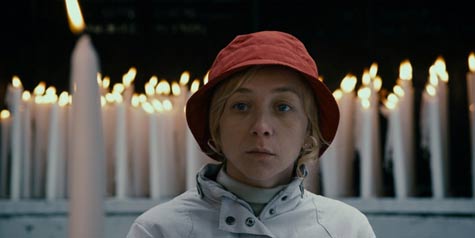
Jessica Hausner's Lourdes |
Wouldn't you know it? I asked directions of the only person in Reykjavik who doesn't speak fluent English. "Do you know how to get to the Clinton hot dog stand?" I queried, and the weathered, rheumy-eyed fisherman mumbled something back in inscrutable Icelandic. Well, I turned a corner and found it on my own: the legendary take-out shack where Bill Clinton, in his porky, presidential, halycon junk-food days, went for the complete package. A so-luscious lamb hot dog with the works: squirts of mayo, hot mustard, a secret orangey sauce, raw onions, and crunchy fried onions, all on a lovely bun.
"The other places, the hot dogs have chicken or pork," the solo woman in the booth told me, as she prepared a Clinton special, the best "dressed" frankfurter on earth, in about four seconds. "Ours is real Icelandic lamb," she bragged. There are lines at this hot dog stand day and night, and the queues have stretched longer in the last two years. Who can afford to lunch at a real, sit-down restaurant? The once happily prosperous Iceland, where people sipped $10 coffees without worrying about it, has tumbled and skidded, shouldering the worst economic crisis in any country of the West.
How would the Reykjavik International Film Festival, which I was attending, September 17 to 27, be affected by the horrid downturn?
I'd been there three years ago, 2006, and was amazed that a modest festival in the tiniest country managed such a sterling line-up of films, and could attract such a formidable A-list of guests. (Perhaps everyone, including the famous and privileged, desires to visit exotic Iceland in a lifetime?) I recall Fest meals at sublime restaurants, and gobbling my dinner among global director luminaries such as Canada's Atom Egoyan, Russia's Aleksandar Sokurov, and the Kurdish maestro, Bahman Ghobadi.
In 2009, the films from about the globe were just as excellent as before. Why go to Cannes or Venice, when Reykjavik beckons? This year's fest was the site of at least one major discovery: Jessica Hausner's Lourdes, a narrative film set among the pilgrims to the Catholic holy place in the Pyrenees, those hoping to be cured of cancer, to be able to leap up from their wheelchairs. This brilliant meditation on faith and spirituality comes from a young Austrian filmmaker who, she explained at Reykjavik, lost her religion at 16.
Festival dinners in 2009 were far more modest than earlier, i.e., a night out for the invited filmmakers and journalists at a pleasant organic fish-and-chips joint. And economics dictated a trimming of filmdom superstars. Still, the Reykjavik fest made a savvy pick in importing just one: veteran director, Milos Forman. He's beloved in Iceland for his early films made in Czechoslavakia such as Loves of a Blonde and The Fireman's Ball. And he's adored everywhere for succeeding in America with multi-Oscar winners, One Flew Over the Cuckoo¹s Nest and Amadeus.
It was an emotional moment in Reykjavik when a sold-out audience rose to its feet applauding Forman, 77, at the end of an Amadeus screening. "How do you feel watching your film made well over twenty years ago? Were you moved?" Forman was asked. "I'm moved that you in the audience still care for this film after more than twenty years. Thank you!" was Forman¹s gentlemanly reply.